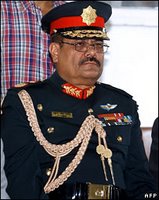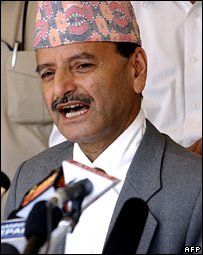
Nepal's army chief, Gen Pyar Jung Thapa, has ended active duty.
Gen Thapa began one month's leave on Friday, a tradition for the head of the army before retiring.
Gen Thapa has been subject to widespread criticism for his role in the government's crackdown against pro-democracy activists this year.
He has denied any wrongdoing. A judicial commission interrogated him last month over the protests, in which more than 20 people were killed.
The protests resulted in King Gyanendra giving up direct rule.
The commission is yet to submit its report.
Unified command
The army's second-in-command, Lt. Gen Rukmangad Katuwal, is expected to be appointed the acting army chief.
The army led the unified command of security agencies that was deployed to maintain law and order during the protests.
Hundreds of thousands of people took to the street across the country to press for the restoration of democracy during the three weeks of protests.
A multi-party government has been in place since then.
After the restoration of parliament, the House of Representatives severed the king's ties with the army and changed the name of the Royal Nepalese Army to the Nepali Army.
Gen Thapa began one month's leave on Friday, a tradition for the head of the army before retiring.
Gen Thapa has been subject to widespread criticism for his role in the government's crackdown against pro-democracy activists this year.
He has denied any wrongdoing. A judicial commission interrogated him last month over the protests, in which more than 20 people were killed.
The protests resulted in King Gyanendra giving up direct rule.
The commission is yet to submit its report.
Unified command
The army's second-in-command, Lt. Gen Rukmangad Katuwal, is expected to be appointed the acting army chief.
The army led the unified command of security agencies that was deployed to maintain law and order during the protests.
Hundreds of thousands of people took to the street across the country to press for the restoration of democracy during the three weeks of protests.
A multi-party government has been in place since then.
After the restoration of parliament, the House of Representatives severed the king's ties with the army and changed the name of the Royal Nepalese Army to the Nepali Army.


